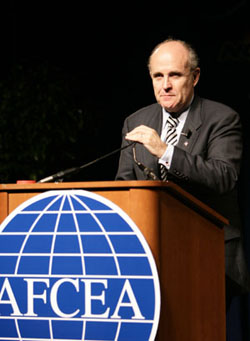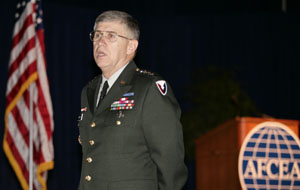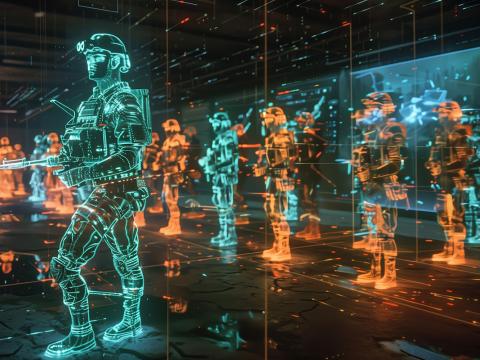Wednesday, May 18, 2005
“Those terrorists didn’t attack us for our foreign policy. They attacked us for who we are and what we stand for--freedom.”
—Rudy Giuliani, former mayor of New York City.
 |
Rudy Giuliani, former mayor of New York City, begins the second day of TechNet International 2005 with Wednesday’s opening plenary address. |
The theme of Giuliani’s address was leadership, for which he was named Time Magazine’s person of the year in 2001. His focus on that topic included examples and issues that related to the AFCEA audience, especially in homeland security.
Giuliani built his remarks around what he described as the seven qualities of leadership. The first quality is to establish a set of beliefs and to stick to it. Ronald Reagan, whom Giuliani described as his hero, built his successful presidency around that approach. The second is to be an optimist, as people tend not to follow a doomsday pessimist. The people who move up in an organization are those who are positive and suggest solutions, he stated.
The third quality is to have ethics. Giuliani, who rose to fame as a U.S. attorney prosecuting a raft of criminals in the New York area, emphasized that individuals must train themselves to play by the rules in a highly competitive environment and not become a leader who suggests evil solutions—like Osama bin Laden.
The fourth quality is to have courage. People should feel fear, but they also should overcome it, he explained. Emergency rescue personnel train to risk their lives to save others, so they mitigate their fear by understanding the risk and preparing for it. Giuliani said that this approach should be applied to the American people’s response to terrorism. The terrorists try to perform attacks that surprise us, he noted, and the public should understand that risk and prepare for it. He pointed out that people stand a greater chance of being killed by a drunk driver than by a terrorist attack, but the public understands that risk and lives its lives accordingly.
Relentless preparation is the fifth leadership quality. Giuliani cited a judge who once said, “If you prepare for everything you can anticipate, you’ll be ready for the unanticipated.” Giuliani related that this approach helped him and his team of government and private sector leaders respond to the September 11 attacks. No one had planned for that particular catastrophe, but other contingency plans were adapted and implemented to begin the difficult task of response and recovery. Again, he urged that this approach be applied to homeland security. “I’m a big believer in relentless preparation,” he said. “We really don’t know how [the terrorists] will attack us next time.”
The emergency responders’ teamwork represents the sixth aspect of leadership. A leader must know his or her own weaknesses and the value of other people. Balancing strengths and weaknesses of a team will get the most out of it. The seventh leadership quality is communication. A good leader will get his or her ideas into the minds and hearts of other people.
Giuliani emphasized that the world is safer now than in 2001 because the United States is facing the danger of terrorism realistically. The world had not done so before the country was attacked, and often the response to terrorism effectively rewarded the terrorists for their acts. He cited how some countries gave terrorists “a ticket to the international bargaining table” after being victimized by them. Now, the United States is leading the way in hunting down the terrorists and keeping them on the defensive.
That does not mean that the United States will not be attacked in the future, he cautioned, adding that there probably will be another attack. However, the country is and will be safer because of this post-September-11 doctrine.
“Those terrorists didn’t attack us for our foreign policy. They attacked us for who we are and what we stand for--freedom. They don’t believe in freedom,” he declared.
The day’s second plenary speaker literally got down to the nuts and bolts of the war on terrorism. Gen. Benjamin S. Griffin, USA, commanding general, U.S. Army Materiel Command (AMC), described how the command is modernizing its technologies and methodologies to constantly improve support to the warfighter.
 |
Gen. Benjamin S. Griffin, USA, commanding general, U.S. Army Materiel Command, gives the Wednesday afternoon plenary address for TechNet 2005. |
The general described the Army’s key information technology components: the Enhanced Position Location and Reporting System (EPLRS), the Joint Tactical Radio System (JTRS), the Warfighter Information Network—Tactical (WIN-T), the Single Channel Ground and Airborne Radio System (SINCGARS), the Force XXI Battle Command Brigade and Below (FBCB2) and Blue Force Tracker, ground targeting and satellite communications integration.
On top of these components, the Army needs good information security, satellite alternatives, bandwidth optimization, sub-orbital retransmission capabilities such as unmanned aerial vehicles, use of the terrestrial network and joint interoperability. Possible solutions for these requirements include public key infrastructure (PKI), data compression, the network operations center—vehicle (NOC-C) and the RAID blimp.
The general also called for rapid introduction of technology into the force, followed by spiraling it for improvement. He cited the need for efficiency in the acquisition process.
“We need to be faster, more agile, less bureaucratic,” Gen. Griffin offered. “We need to fight this every day.”
In response to that statement, several audience members stood during the question-and-answer period following the general’s address and cited examples of how their proposed technology solutions were being swallowed up by the very bureaucracy that the general decried. To each person, Gen Griffin offered to take their telephone number and to have someone look into remedying the situation within 24 hours.
—Scheduled for Thursday at TechNet International 2005: The J-6 Panel, chaired by Lt. Gen. Robert Shea, USMC, J-6, the Joint Staff; and a panel on network-enabled operations from the combatants’ perspective.




Comments